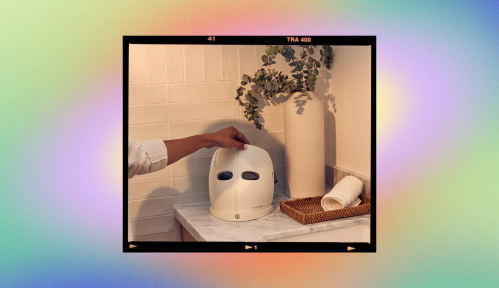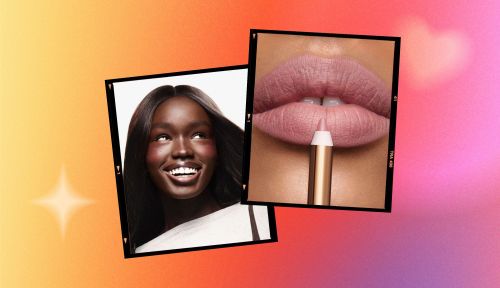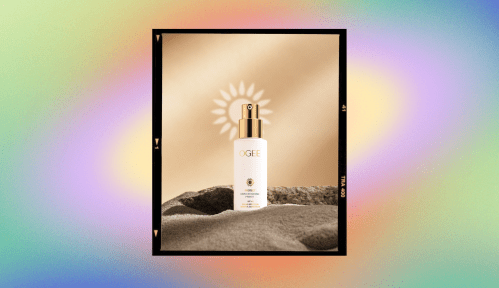Our editors independently select these products. Making a purchase through our links may earn Well+Good a commission
I Tried Washing My Hair With Baking Soda To Rid My Oily Scalp of Grease and Grime
Discover the uses of baking soda for hair care, from clarifying shampoos to scalp exfoliation. But, know it can be harsh and cause dryness.
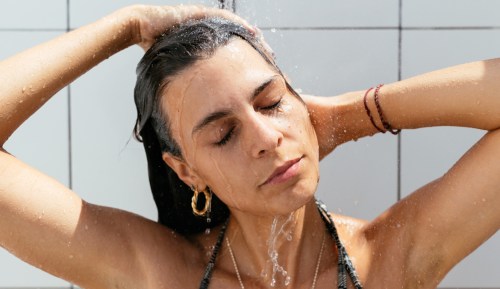
DIY beauty hacks, trends, and experiments are always cropping up—especially when it comes to hair care. Popularized by the “no poo” trend that involves ditching traditional shampoos for “natural” alternatives, using baking soda for hair is, apparently, a thing.
According to Annie Gonzalez, MD, board-certified dermatologist, swapping your traditional shampoo or scalp scrub for baking soda can potentially help remove buildup and soothe irritation—but the method doesn’t come without drawbacks. However, I have an incredibly oily scalp and am willing to try anything to extend my wash another day, so I put the DIY method to the test to find out: What are the benefits of washing hair with baking soda? And does it even work?
Ahead, we got all the answers so you can read up before you turn your kitchen into a science experiment.
Is baking soda good for your hair?
In short, washing your hair with baking soda is probably not something to adopt long-term. But it can have some short-term benefits. Baking soda, also known as sodium bicarbonate, is antiseptic and anti-inflammatory, meaning it can help calm skin and fight impurities. It also absorbs oil while exfoliating dead skin cells from the skin’s surface, which, according to Gonzalez, makes it a potentially beneficial DIY clarifying shampoo for those with oily scalps. You might’ve also seen people using baking soda for grey hair. “Anecdotally, people have used baking soda to lighten or brighten grey hair, but there is no scientific evidence to support that effect,” says Ivy Lee, MD, a board-certified dermatologist in California and Medical Director of Direct Dermatology. So while it’s fine to try, you might not actually see a difference—and there are more serious drawbacks than you might think.
Risks of using baking soda for hair
While most hair types can tolerate a baking soda detox every once in a while, like any DIY beauty experiment, it comes with some risks. “Using baking soda is proposed as a natural option to address oily hair and scalp,” says Dr. Lee. “However, with a pH of 8.5, it’s alkaline, meaning it can strip the hair shaft and scalp skin of its natural oils.” In one 2014 study published in the Journal of Trichology, researchers found that “the [shampoo] formula and ingredients must create a final pH no higher than 5.5 so as not to damage the scalp.”
Gonzalez notes that baking soda for hair can cause irritation, dryness, brittleness, and even hair breakage. In more sensitive scalps (or at higher concentrations), it can even cause chemical burns. Modern commercial shampoos tend to leave less residue than traditional ones, Gonzalez explains, and over-exfoliation—whether on the scalp or the face—almost always leads to barrier disruption, inflammation, and acid mantle disruption.
For these reasons, dermatologists suggest that anyone with a sensitive scalp; a history of scalp eczema or related scalp issues; very dry, brittle, or color-treated hair; or any open sores avoid using baking soda as a scalp exfoliant.
How do you wash your hair with baking soda?
Even with the potential risks, I was willing to put baking soda to the test for the sake of journalism. But how does one even wash their hair with baking soda powder? Gonzalez suggested I create a paste by diluting baking soda powder with water and massaging it into my scalp, letting it sit for just a few minutes before rinsing it out. Just like your standard exfoliants and clarifying shampoos, baking soda isn’t meant for everyday use. It should be used infrequently—once or twice a month, or (at most) once a week for those with especially oily scalps.
Can you mix baking soda with shampoo?
It might seem like a good idea to mix baking soda with your shampoo to create a better, more satisfying lather, but Dr. Lee doesn’t recommend it. “It’s hard to predict how baking soda will interact with the other ingredients in the shampoo, especially with such little scientific data around baking soda for hair,” she says. So if you’re going to try the no-poo trend, stick with a diluted paste.
What happened when I tried baking soda for hair
After I tried the concoction, I wasn’t very impressed—my results were fine, but no better than any commercial clarifying shampoo or scalp exfoliant I’ve used. If anything, my hair felt slightly dryer than usual. (Dr. Lee notes that this is what happens when you strip the hair and scalp of its natural oils.)
On top of that, the anxiety and fear I felt while using baking soda for my hair (Am I doing this right? Will this wreck my scalp? Have I washed it all out?) definitely made the experience less than enjoyable.
“There’s this misconception that ‘all-natural’ is inherently better,” Gonzalez says. “Remember that even the natural stuff is made from chemicals and therefore forms chemical reactions, especially when coming into contact with your skin.” So if you have an oily scalp, excess product build-up, or dandruff, your best bet is looking for products formulated by scientists, backed by data, and tweaked to perfection.
What are the best products for oily scalps?
For this reason, she prefers commercial exfoliants and clarifying shampoos over raw baking soda. She suggests products formulated with flake-and-oil-busting pyrithione zinc (which is an FDA-approved OTC ingredient) and made for everyday use. Instead of a shampoo, you could opt for chemical scalp exfoliants bolstered by AHAs and BHAs, or a physical scalp scrub.
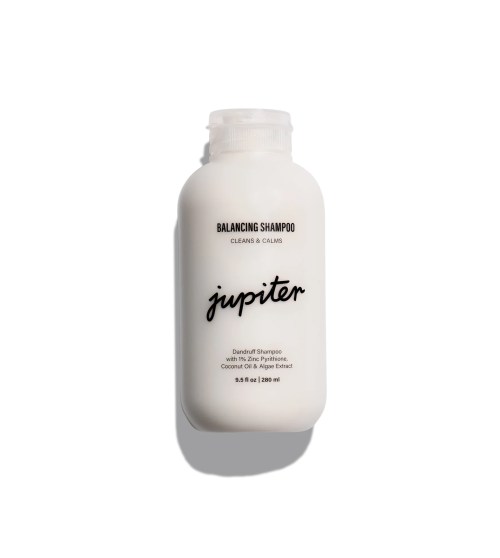
Jupiter, Balancing Shampoo — $25.00
Consider this the modern day dandruff shampoo. It still relies on the hero ingredient pyrithione zinc, but it’s also formulated with squalane, coconut oil, and other hydrators to keep your hair feeling moisturized and strong.
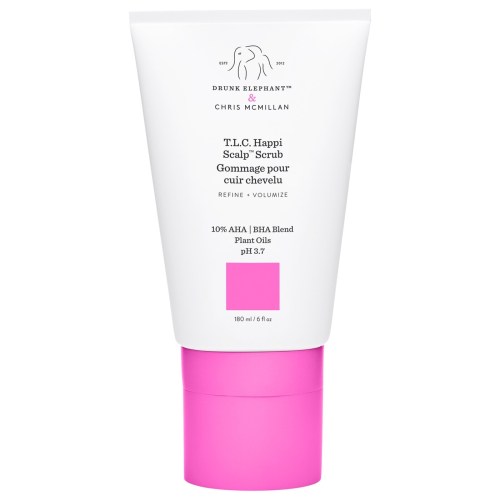
Drunk Elephant, T.L.C. Happi Scalp Scrub — $38.00
This derm-approved scalp scrub from Drunk Elephant is formulated with glycolic, tartaric, lactic, and citric acids to exfoliate, plus biodegradable beads for that scrubby, extra clean feeling.
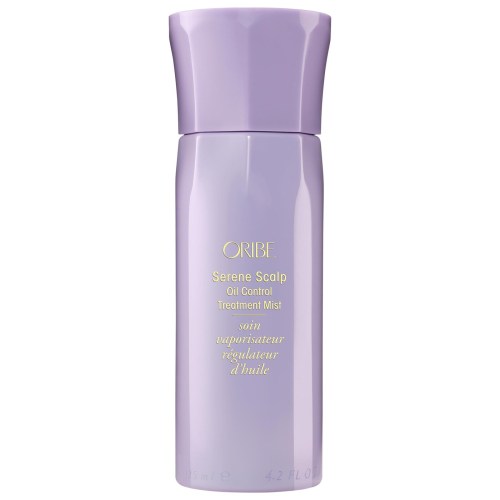
Oribe, Serene Scalp Oil Control Treatment Mist — $58.00
If your main reason for considering baking soda for hair is to control excess oil, this new skincare-inspired mist from Oribe aims to do the same thing. It combines prebiotics with marine algae and peppermint oil to mattify the scalp without clogging pores.
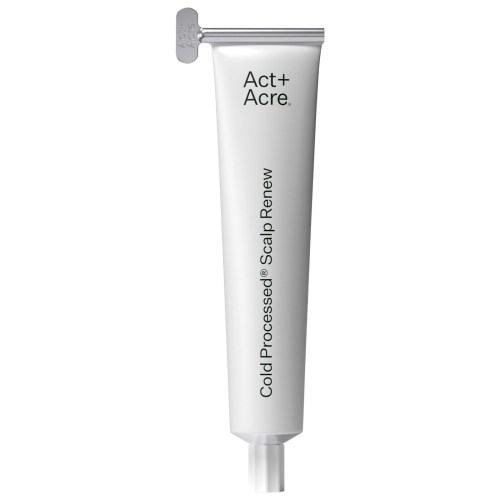
Act+Acre, BHA Salicylic Acid Scalp Renew Exfoliator — $48.00
Act+Acre’s trichologist-founded formulations are gentle and effective. This bestselling pre-wash scalp exfoliant relies on salicylic acid to gently lift up product buildup and dirt, plus cooling peppermint oil which can control itching.
Bottom line
We hate to be the bearer of bad news, but when it comes to scalp care, there’s more research to support baking soda as a risk and irritant than there is to support its benefits. And while I didn’t notice any particularly alarming issues arise, I think I’ll stick to the well-researched, science-backed formulas and products from now on—and you should, too.
Sign up for the Well+Good SHOP Newsletter
Get exclusive deals on wellness, beauty, fitness, and food products that have been hand-picked by our editors.
Got it, you've been added to our email list.

